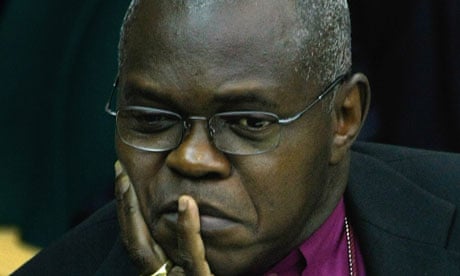Some of the most senior bishops in the Anglican and Roman Catholic churches in Britain have united to warn that legalising gay marriage would be a dangerous and unjustified change in the law.
The archbishop of York, John Sentamu, said on the BBC's Andrew Marr Show: "I happen to believe that to change the law in the end would be forcing an unjustified change."
The Catholic archbishops Vincent Nichols and Peter Smith, president and vice-president of the bishops conference, said in a letter read out at all masses in England and Wales: "Changing the legal definition of marriage would be a profoundly radical step. Its consequences should be taken seriously now."
Sentamu said he was pleased with the tone of the letter, and insisted that although he supported civil partnerships, that was not the same as marriage.
"People do not want to talk these days about difference. There is a difference between civil partnerships and marriage. That difference does not mean one is better than another," he said.
He warned that the government could face legal problems in any attempt to change the definition of marriage. "They have got a problem because the definition of marriage is in the 1662 prayer book and article 30 of the Church of England, which both are acts of parliament."
The letter from the Catholic bishops argued that it was invalid to claim that a change in the law was a move towards ending discrimination. "Our present law does not discriminate unjustly when it requires both a man and a woman for marriage. It simply recognises and protects the distinctive nature of marriage."
It went on: "A change in the law would gradually and inevitably transform society's understanding of the purpose of marriage. It would reduce it just to the commitment of the two people involved. There would be no recognition of the complementarity of male and female or that marriage is intended for the procreation and education of children.
"We have a duty to married people today, and to those who come after us, to do all we can to ensure that the true meaning of marriage is not lost for future generations."




Comments (…)
Sign in or create your Guardian account to join the discussion